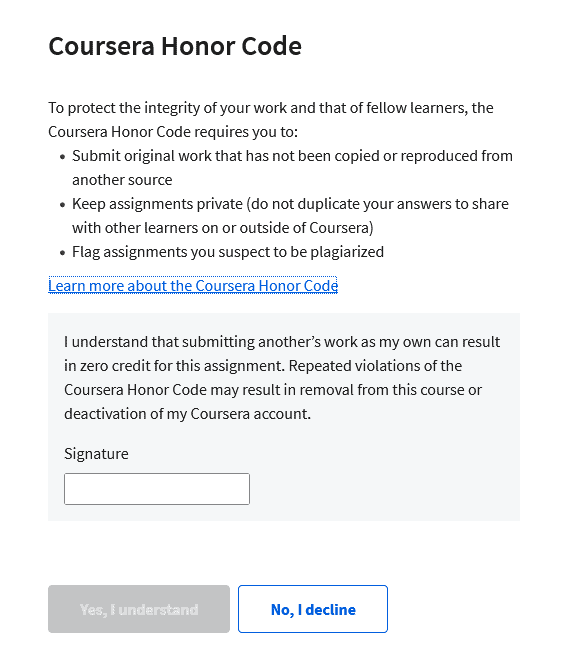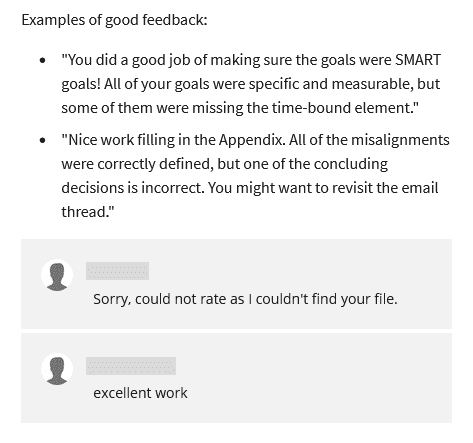Not Just Plagiarism: Investigating the Integrity of Peer Reviews in Online Learning
In peer reviews, learners grade one another. But are they fair and thorough? Let’s put it to the test.
In 2021, I highlighted the problems with peer-assessed assignments. Two years on, complaints about blatant plagiarism and other issues still appear on sites such as Reddit. Intrigued, I examined several Coursera courses for Honor Code breaches and to see if peers would approve an inadequate submission.
What I did
I picked six courses1 with peer assessments and submitted the bare minimum, titled “My Project”. I then assessed at least ten submissions for each course using the provided rubrics, referring to the course materials to ensure fairness in my experiment. I ran some submissions through the free plagiarism checker Plagiarism Detector.net.
Coursera’s Attempts to Reduce Plagiarism
In the past few years, Coursera has attempted to reduce plagiarism in assignments by emphasizing the Honor Code with pop-ups and checkboxes.

Coursera has also made it impossible to copy and paste assignments submitted by others. To pass off someone else’s answer as your own, you’d need to type it out entirely. An exception to this is when the assignment is submitted as an attached document. Often these can be copied easily.
When I composed a response in a Word document and pasted it into my submission, a pop-up window appeared asking if the pasted content was indeed my own work.
Unfortunately, this means that if you want to check for plagiarism, you may need to type out the assignment or an extract.
Nobody can honestly claim ignorance of the rule that prohibits submitting someone else’s work as their own.
But plagiarism isn’t the only issue with peer-assessed assignments reported on sites such as Reddit.
Other Issues
- Blank answers
- Irrelevant answers that don’t address the prompts at all
- Submitting a provided example answer
- Answers written by AI tools
- Revenge scoring (if you give a low grade for an inadequate assignment, that person scores your assignment down)
- Dishonest scoring (such as giving a full score for a blank assignment)
These issues are all covered in the Honor Code, either at the submission stage or while assessing. While blank answers are not specifically forbidden, if reviewers adhere to the Honor Code when assessing, blank answers will not receive a passing grade.
- Submitting the example given is not your own work and is thus plagiarism
- Using AI tools is forbidden by Clause 4 of the Honor Code (as well as not being your own work). ChatGPT is specifically mentioned
- Giving credit for blank or irrelevant answers is covered by Clause 8: “any other behavior that confers an unfair advantage to you or someone else or any activity that attempts to dishonestly improve your results or improve or harm the results of others in the performance of work within a Coursera activity.” This clause also covers revenge scoring and dishonest scoring. (This currently private Reddit post claims that the learner was given a low score by a peer for a serious submission in revenge for awarding a low score for that peer’s plagiarized assignment.)
Submissions From Other Learners
When reviewing my peers’ assignments, I did not detect any identical assignments or use of example answers. I used plagiarism checkers for some answers. The biggest issue with plagiarism was for the Google Project Management Capstone, with plagiarism checker Plagiarism Detector.net finding the likelihood of plagiarism in submitted answers ranging from 0% up to 70%. I also encountered some of the other issues mentioned above.
| Course1 | Valid Answers (of 10 checked) |
| UX Design | 8 |
| Creative Problem Solving | 5 |
| Gut Check | 10 |
| Greening the Economy | 10 |
| Create in Figma | 10 |
| Google Project Management Capstone | 9 |
Two answers for the UX Design course were incomplete, but the others were well done. A shock for me was Creative Problem Solving. Three assignments had no uploaded files. Another assignment had three copies of a 46-page paper written in French attached. When I pasted a section into Google Translate, there was absolutely no relevance to the question. A fifth assignment was incomplete. Apart from these, most assignments I read were high quality and I had no hesitation awarding full scores. Some (including suspected plagiarized answers) lost points because they did not fully cover the grading rubric.
My Submission Results
I was gobsmacked by some of the results and positive comments I received for my empty assignments.
| Course1 | Number of reviewers | My Score | Result |
| UX Design | 2 | 15 | Pass |
| Creative Problem Solving | 5 | 4 | Fail |
| Gut Check | 2 | 0.5 | Fail |
| Greening the Economy | 3 | 2 | Fail |
| Create in Figma | 2 | 0 | Fail |
| Google Project Management Capstone | 2 | 9 | Fail |
I noticed that most of my assignments were reviewed by two peers. My results varied widely in some courses and Coursera allocated more reviewers to arrive at an average score.

I received emails from Coursera asking me to check my submissions for two courses. Possibly some peers reported my blank assignments to Coursera. Other users sent a polite message telling me that my assignment was not attached.
Another aspect I noticed was for most, if not all, assignments, the passing score was not mentioned until after submission and assessment. If you make sure your submission addresses all the points in the instructions, you should have no trouble passing. I only saw the passing score after I failed the assignments.
Conclusion
While some progress appears to have been made in attempting to stamp out plagiarism, many issues are still rampant in the peer assessment world. If learners abide by the Honor Code while assessing as well as while submitting assignments, there would not be a problem.
Footnote 1:
Courses used in this Experiment:
Start the UX Design Process: Empathize, Define, and Ideate The first peer-assessed assignment in the Google UX Design Professional Certificate Specialization asks learners to use a template to create two different personas so I submitted the blank template. Two peers gave me full scores!
Creative Problem Solving I submitted an empty assignment for week 1. I did not upload any files. Five peers gave me wildly varying results. In my experiment, this course had the most invalid submissions.
Gut Check: Exploring Your Microbiome This assignment would not allow me to submit nothing, so I submitted “I wrote a sentence to submit for my assignment.” This was accepted by the minimum word count requirement. My peers did their job and I failed the assignment.
Greening the Economy: Sustainable Cities Six prompts were supplied, worth various points each, but my empty submission was accepted even though I answered none of them. However, the next day I received an email from Coursera asking me to check my submission. My assignment was stuck in “Grading in progress” status until I submitted “I wrote a sentence to submit for my assignment” for the first prompt, leaving the other prompts blank. Within 48 hours, I received my results. One peer had given me full scores for every section. Another gave me zero. A third gave me two points for the sentence I’d submitted and zero for all the other sections, so two was my final score.
Create High-Fidelity Designs and Prototypes in Figma The fifth course of seven in the Google UX Design Professional Certificate asks for a link to a project in Figma. I submitted an empty assignment without a link. My peers correctly gave me zero.
Capstone: Applying Project Management in the Real World This is the final course in the Google Project Management Professional Certificate. Unlike some other Capstone projects, I was able to enroll in this course and submit a blank assignment without passing the previous courses in the Specialization. One peer gave me zero, the other gave me full points, so the result was averaged to nine. 15 are needed to pass. In my experiment, this course was the most prone to plagiarized answers.







Connor
Thank you for this in-depth review. I came across your article as I’ve been completing some Coursera programs and have been surprised by the number of junk or irrelevant submissions. Did you get any insights into why people are submitting junk/blank? Just for the certificate?